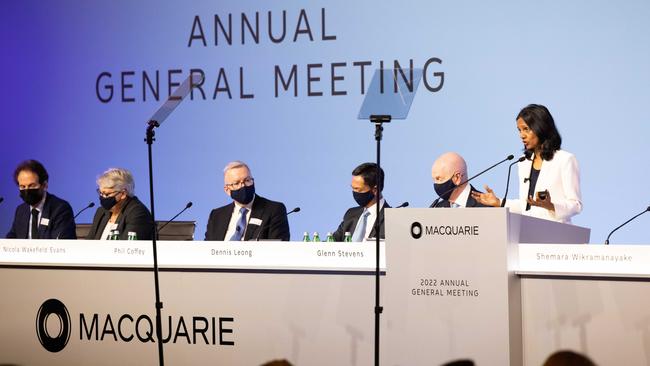Macquarie Group talks up business mix, issues warning on economic outlook
Despite a strong start to the year, Macquarie cautioned of weakening trading conditions and shied away from providing 2023 earnings guidance to coincide with its AGM.

Macquarie has used a better-than-expected start to its financial year to highlight diversification across its business units, which it says will provide some protection against softer trading conditions and a tougher economic climate.
The asset management and investment banking giant posted stronger first-quarter income than last year, buoyed by commodities trading and hedging activity and asset sales in its Green Investment Group.
Despite the strong start, Macquarie cautioned of weakening trading conditions and shied away from providing 2023 earnings guidance to coincide with its annual meeting on Thursday.
There were changes to the outlook for various divisions, including the commodities and global markets unit, where Macquarie moved away from saying income would be significantly down and noted market conditions made forecasting difficult. It said volatility could create opportunities across areas such as risk management, storage and hedging in commodities.
Macquarie chief executive Shemara Wikramanayake said while the decline in equity markets this year could weigh on asset management fees and deal advisory income, other parts of the business would benefit from volatility and inflation.
“Given the huge diversification of our businesses they are all exposed to very different risks, so there tends to not be one single risk that can really drive our result in one direction or other,” she added.
Macquarie is navigating the sharp rate-rising cycle, inflationary environment and decline in sharemarkets in the 2023 financial year. Inflation figures showed the Consumer Price Index jumped 1 percentage point to 6.1 per cent for the year ended to June 30.
But Ms Wikramanayake noted Macquarie’s infrastructure assets typically performed better than other asset classes at a time of rising rates. “These assets have very good inflation protection in them, so whether they are regulated utilities or they’re toll roads, typically they are able to capture the inflation aspect in the revenue line,” she said.
The group’s asset management arm and banking unit saw their combined first-quarter net profit contribution rise significantly on the same period last year. That was underpinned by income from GIG’s asset realisations, with the contribution from banking “broadly in line” with the first quarter last year.
Ms Wikramanayake said asset sales by GIG included British waste-to-energy investments and a Polish wind asset. The banking unit saw deposits rise 9 per cent on March 31 levels, while Macquarie’s home loan book grew 8 per cent to $96.9bn.
Macquarie’s shares rallied 3 per cent to $178.89 on Thursday as investors cheered the quarterly results. “We think the update reads slightly better than expected and in contrast to global (investment bank) commentary, although this likely reflects timing differences in reporting periods,” UBS analyst John Storey said.
Goldman Sachs analyst Andrew Lyons said the update “was solid” but he expected Macquarie’s earnings to decline in 2023 to $4.1bn.

Macquarie’s last results showed a profit surge to $4.71bn for the year ended March 31, as the commodities and global markets division was again the biggest contributor to earnings.
Macquarie’s business units that are exposed to markets – commodities and global markets and Macquarie Capital – saw combined first-quarter net profit contribution print “slightly up” on the same period last year. That was largely due to improved results across the commodities platform, “including the impact of timing of income recognition on gas transport and storage contracts” and higher investment-related income in advisory arm Macquarie Capital. The short-term outlook for Macquarie Capital pointed to transaction activity being “substantially down” in 2023 after a record period in the previous year.
Macquarie’s new chairman, former Reserve Bank governor Glenn Stevens, used his speech to highlight new a prudential standard, known as CPS 511, which comes into effect in January. Mr Stevens said the board reviewed its pay framework to address the new standard and was implementing changes in a phased way. “The board undertook a review of the remuneration framework … considering the perspectives of shareholders and regulators, global peer group comparisons and the increased global competition for talent,” he added. Macquarie’s asset management unit housed $773.9bn at June 30, up slightly from $773.1bn three months earlier. That division had $28.8bn of equity to deploy at June 30, as Macquarie’s short-term outlook flagged 2023 base fees would be “broadly in line” with the previous year and GIG’s income would be “significantly down” after a bumper 2022. The group’s capital surplus stood at $10.1bn at the end of June.
Macquarie is also taking steps to fix a series of compliance lapses that spurred an enforcement action by the regulator in 2021. The Australian Prudential Regulation Authority forced the firm to hold $500m in additional capital for failings including breaches of reporting standards in its bank. Mr Stevens said Macquarie had made “good progress” on its governance, risk and remediation plan. “As part of the governance workstream, three bank-only non-executive directors are being added to the (Macquarie Bank) board,” he added.
“In May we welcomed Ian Saines as the first BOND. We also announced Michael Coleman’s intention to retire at this meeting, after 10 years on the group board … Mr Coleman has agreed to remain on the Macquarie Bank board for a further two years, thereby becoming our second BOND.
“We expect to announce a third appointment in due course.”
The Macquarie directors up for re-election and election to the board were overwhelmingly supported by investors, and the bank’s remuneration report was signed off by 96 per cent of shareholders.
Mr Stevens was quizzed by investors about a provision for the bank’s legal issues in Germany, which had been made but not disclosed.
There is also the risk of a class action against Macquarie related to a broader issue about facilitating double claiming of tax credits on dividends, which is being pursued by German authorities against a long list of global banks.








To join the conversation, please log in. Don't have an account? Register
Join the conversation, you are commenting as Logout